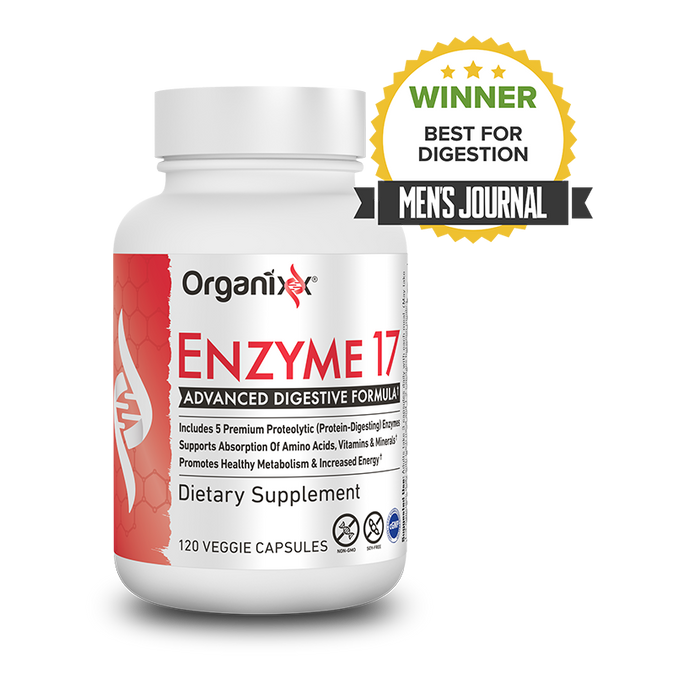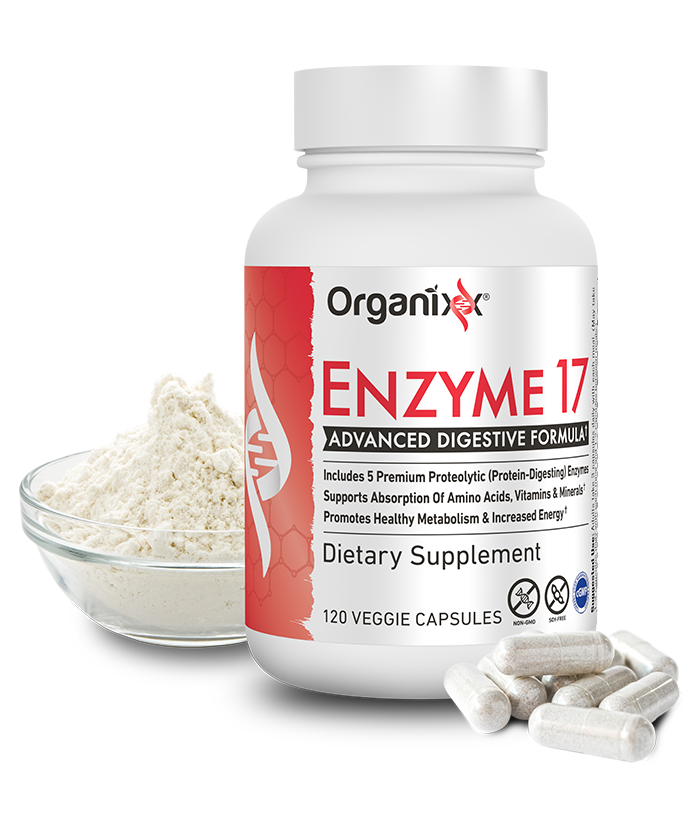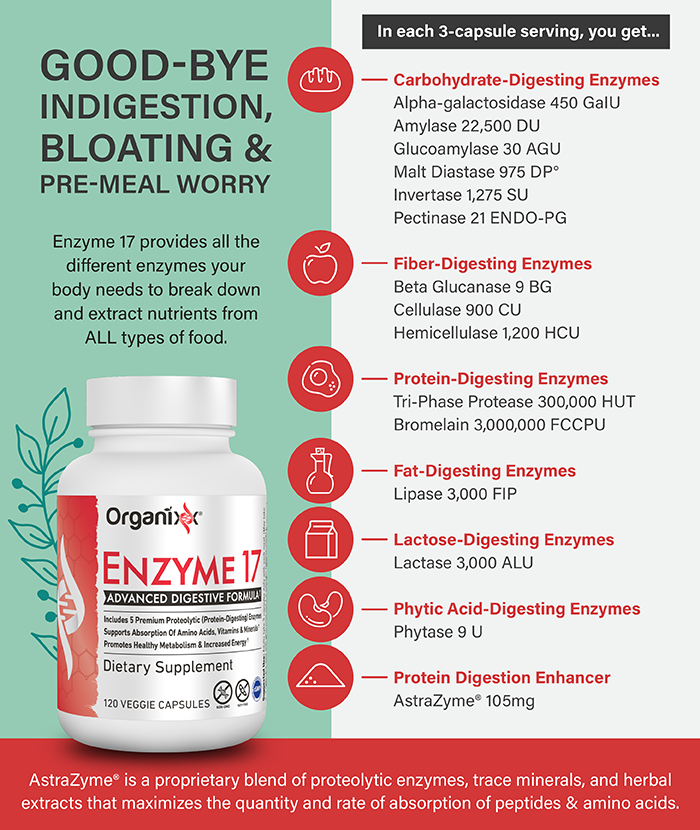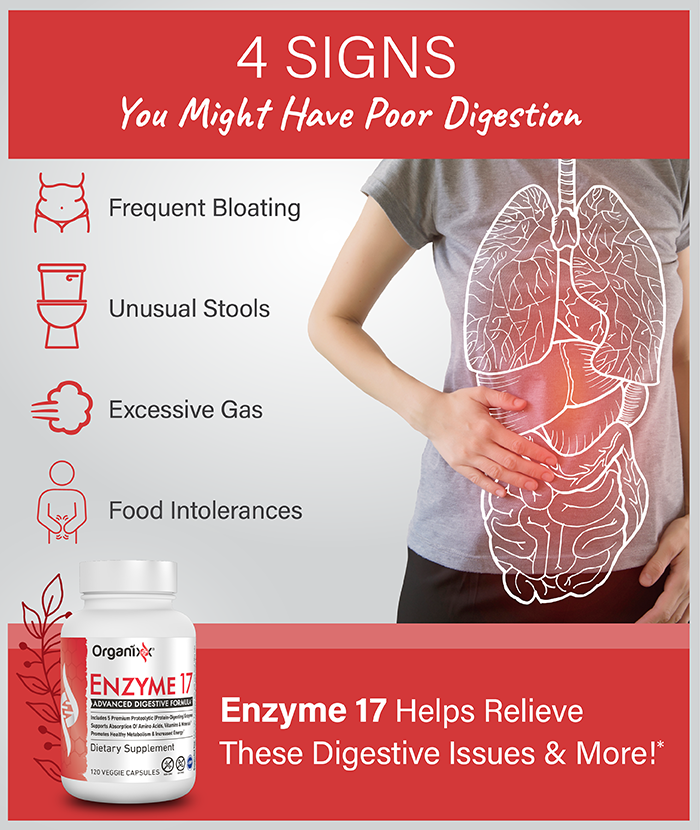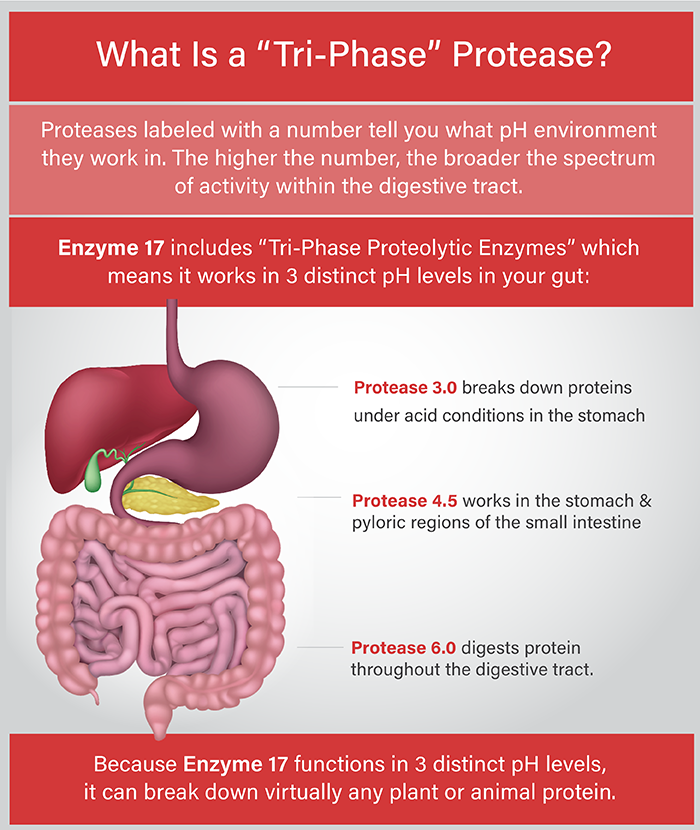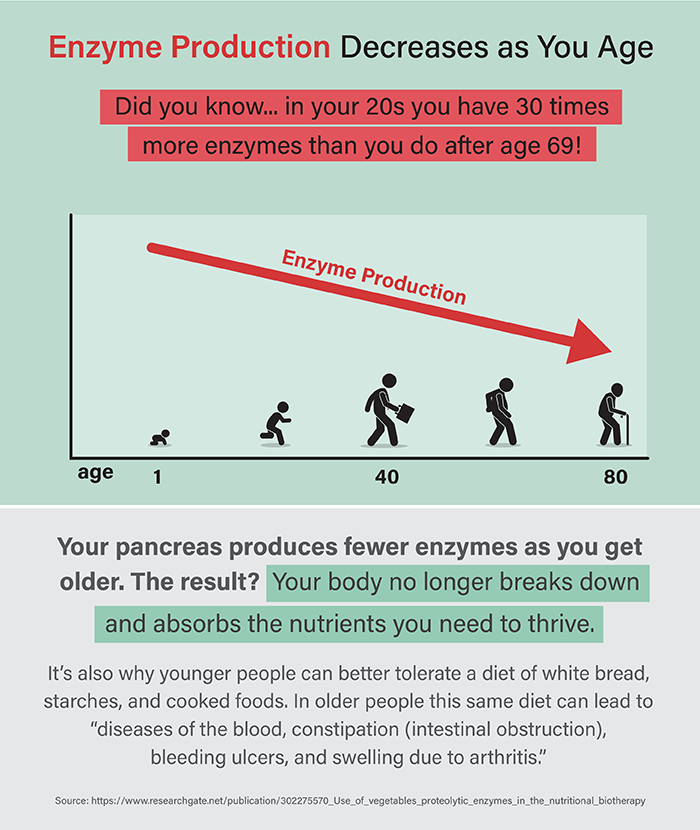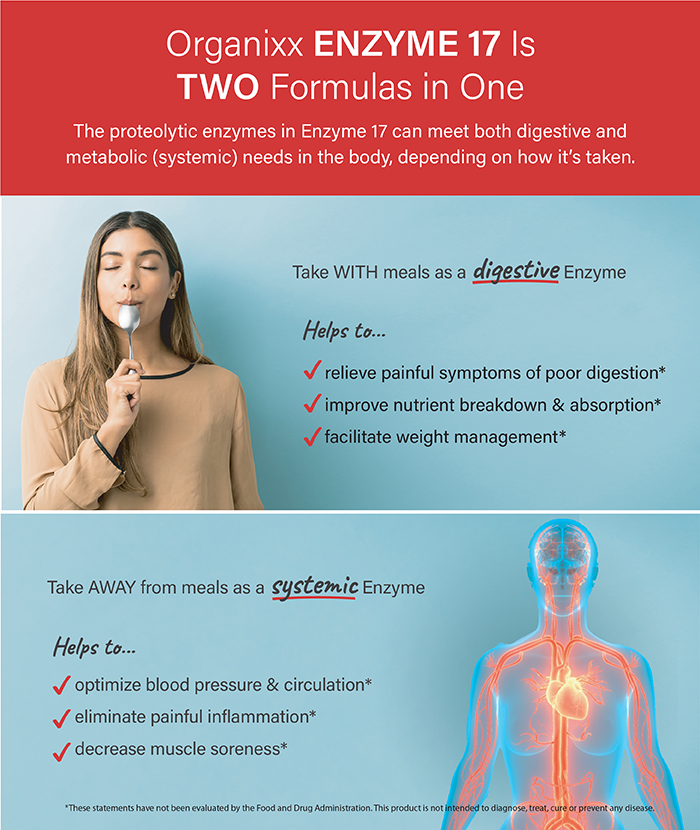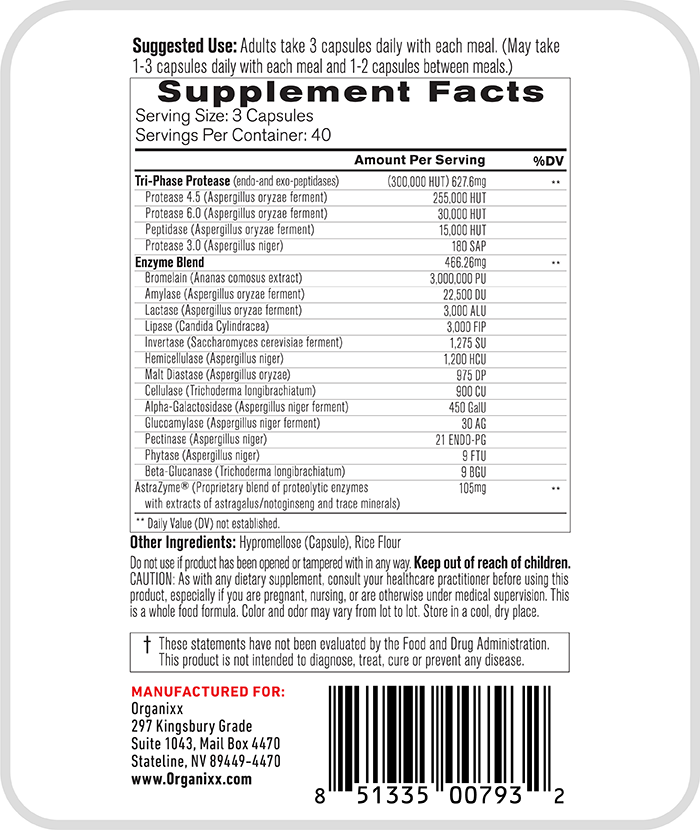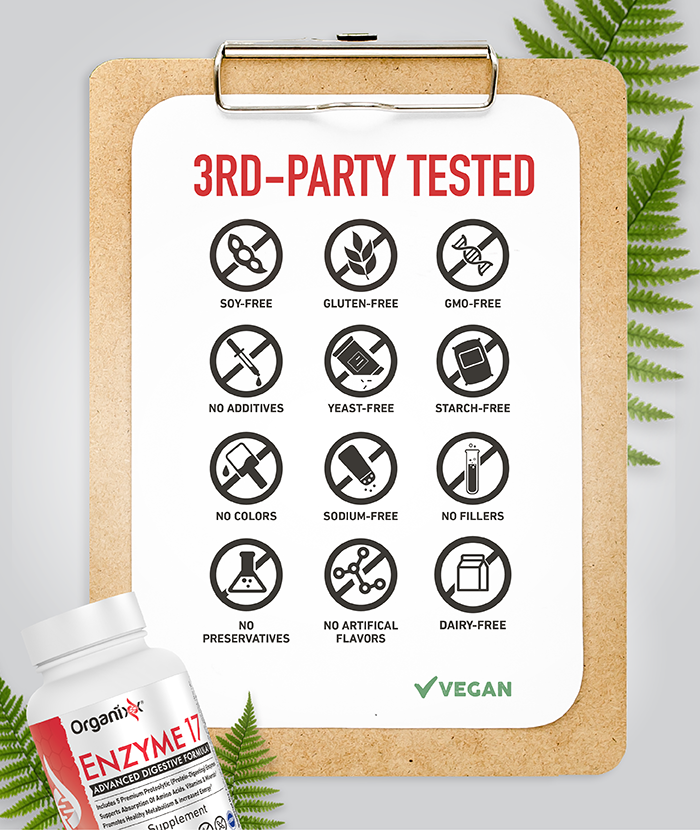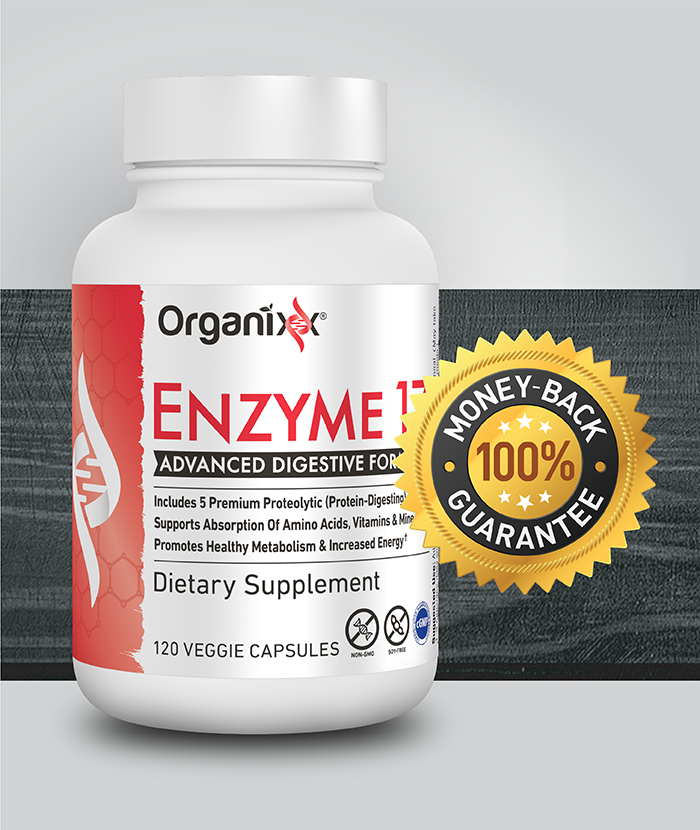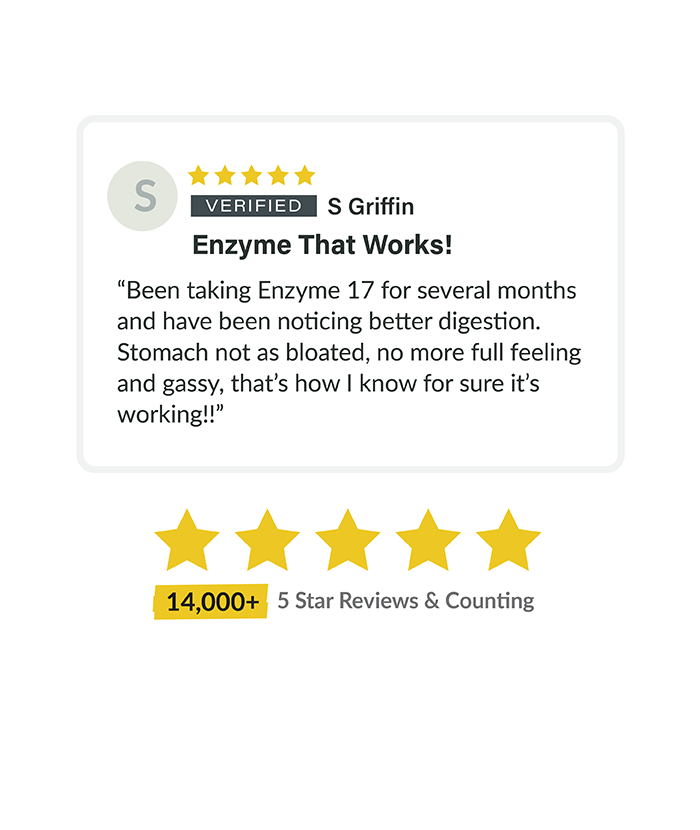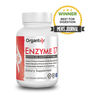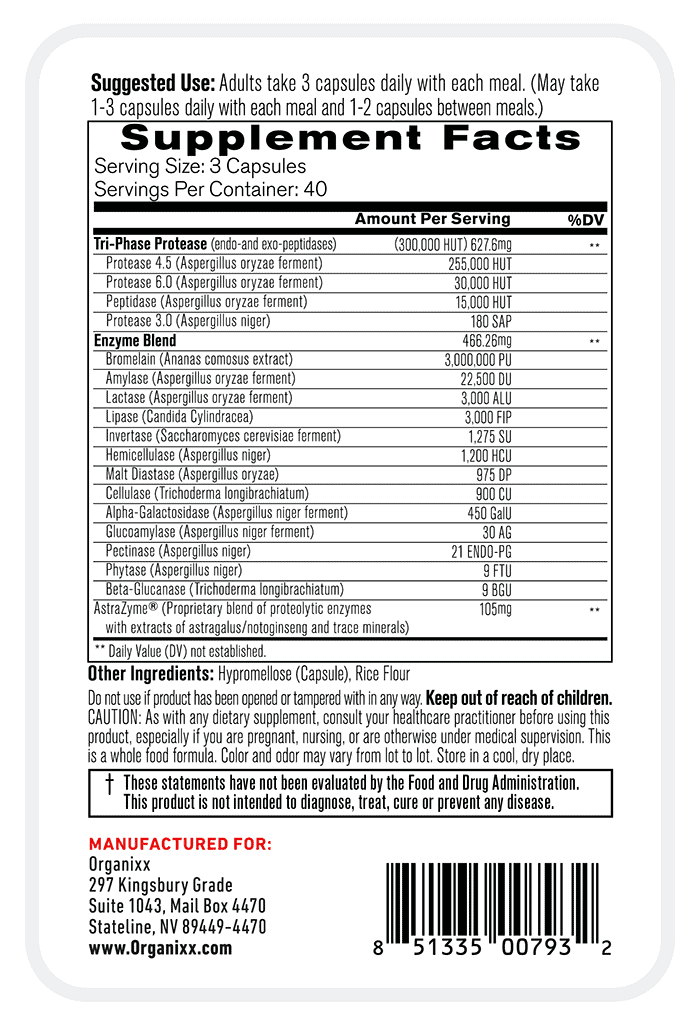BENEFITS
As a Digestive Enzyme (taken with meals)
- Helps eliminate digestive issues such as acid reflux, constipation, gas & bloating*
- Breaks all types of food down faster and more completely for increased nutrient uptake*
- Boosts energy & aids weight management by improving metabolism of carbs, fat, and protein for fuel*
As a Systemic Enzyme (taken away from meals)
- Helps reduce inflammation and scar tissue & speeds up recovery time*
- Dissolves allergens, bacteria, viruses, and other pathogens that can make you sick*
- Optimizes blood flow & decreases plaque buildup for better cardiovascular health*
PRODUCT DETAILS
- Blend of 17 of the best digestive enzymes that help your body extract more nutrients from the foods you’re eating
- Exclusive tri-phase protease (proteolytic enzyme formula) works at every stomach pH: 3.0, 4.5 & 6.0
- Made with cultured enzymes which can be 100 to 1000 times more powerful than food enzymes
- Designed to enhance digestion for ALL types of foods and diets from plant-based to carnivore
- Vegetarian digestive enzymes that contain no dairy, soy, GMOs, chemical fillers, or binders
- Product can be used in TWO beneficial ways: as a digestive enzyme and/or as a systemic enzyme supplement

Dr. Melissa Gallagher,
Naturopathic Physician
One of the things that I absolutely love about Enzyme 17 is that you get a complete blend of full spectrum enzymes. This is a wide range of enzymes that help you not only digest your food but also help you address systemic health conditions like inflammation, yeast overgrowth, autoimmunity, protein deficiency and even sugar addiction. A lot of mild and moderate digestive grievances can be controlled and eradicated by incorporating enzymes into your daily life.
A common yet highly under accessed clinical imbalance is an inability to break down proteins, carbohydrates, and fats. You can support your body and your health by making the most of the foods you eat by allowing full spectrum enzymes to aid in breaking down and assimilating your foods. If you are not consuming fresh and raw fruits and veggies, you are not getting enough natural enzymes from your food. And if you are over 30, your body’s capacity to naturally produce enzymes decreases. These are two reasons why I recommend consuming enzymes before each meal.
Many of my super health-conscious patients still present with protein deficiency, despite their clean consumption of plant-based protein and lean animal proteins.

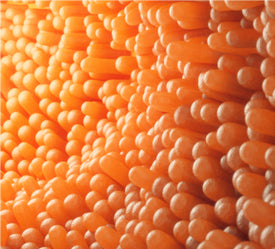
Tri-Phase Proteolytic Protease Enzymes (Breaks Down Proteins, Reduces Acid Reflux & Bloating)
Also known as proteolytic enzymes, proteases are responsible for breaking down the proteins and peptides in food into amino acids – the building blocks of the body used for making and maintaining muscle tissue and organs. But what makes proteases extra special is that they have the ability to act as both digestive enzymes and systemic enzymes. Not only do proteases support optimal digestion, but they’re important for circulatory health, cell division, apoptosis (programmed cell death), and more.4
When taken on an empty stomach, proteases can bypass the stomach and enter the bloodstream directly, where they help to break down excess fibrin. Fibrin is an insoluble protein compound that the body naturally uses to heal injuries by forming scar tissue.5, 6 Too much fibrin in the blood, however, can increase blood pressure and inhibit the healing process by creating inflammation, growths, and adhesions that lead to increased pain, chronic fatigue, and a higher risk of heart attack and stroke.7
Research has shown that proteolytic enzymes can also help to reduce pain, swelling, and bruising after surgery,8 aid with delayed-onset muscle soreness after exercise,9 and help with managing pain in patients with inflammatory conditions.10 They are also increasingly being used in cancer treatment and management.11
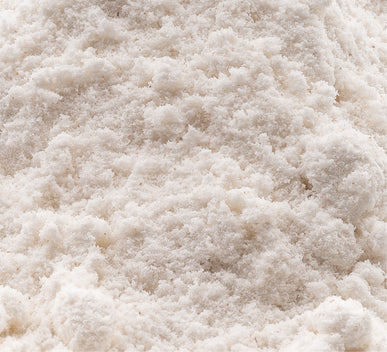
Digestive Enzyme Blend (Breaks Down Carbohydrates, Fats, & Proteins)
Enzyme 17 offers a proprietary full-spectrum blend of 13 different digestive enzymes designed to enhance digestion for ALL types of foods and dietary styles. Digestive enzymes help to pre-digest food before it passes into the stomach and small intestine, mimicking the enzymes naturally produced by the pancreas.12 Only when food is broken down (i.e., digested) can nutrients be extracted and utilized by the body.
There are many diverse kinds of digestive enzymes which are needed for digesting different kinds of foods. For example, people who can’t digest dairy products (a condition known as lactose intolerance) can find relief by supplementing with the enzyme lactase.13 People who get gassy when eating beans and cruciferous vegetables can benefit by supplementing with the enzyme alpha galactosidase. Most people eat a broad range of foods that include different types of carbohydrates, fats, and proteins, and will benefit from a full-spectrum digestive enzyme supplement.
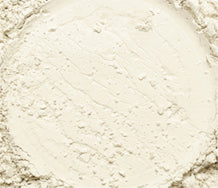
AstraZyme® (Increases Nutrient Absorption by Up to 66%)
A proprietary and proven combination of enzymes, herbal extracts, and trace minerals, the word AstraZyme® literally means “vehicle of energy”. Studies have shown this proprietary formula to dramatically enhance (by up to 66%!) the absorption of nutrients your body needs to function properly – including arginine, citrulline, tryptophan, folate, and glucosamine.
After water, your body is mostly made up of protein. In order for your body to effectively use the protein in the foods you eat, it must first be completely broken down from long-chain amino acids into peptides and single amino acids. These molecules then need to be efficiently absorbed to be of any value. AstraZyme enhances digestion by addressing both aspects of protein utilization needed for optimal health:
- The complete breakdown of protein
- Enhanced absorption of peptides and amino acids
The herbal extracts in AstraZyme come from two different plants: Panax notoginseng and Astragalus membranaceus. Both have been used for centuries and are well-known for their antioxidant and anti-inflammatory properties, as well as their ability to help strengthen the immune system. This specific herbal combination has been validated by science and demonstrated to enhance the cellular absorption of amino acids, vitamins, and glucose in both In vitro and In vivo studies.14

3rd-Party Tested & Verified
Organixx pays to have all our products tested by NSF (an internationally recognized leader in independent product testing) and other highly reputable third-party testing labs. These third-party laboratories test for glyphosate (the active ingredient in Roundup), GMOs, pesticides, herbicides, insecticides, and heavy metals. We're proud to be one of the few (if not the only) supplement companies to openly and honestly share all of the test results on our website. Click here to see 3rd-party test results for our Enzyme 17.
If your doctor is in agreement, we suggest a daily dose of one (1) capsule for every 20 kg (44 lbs) of body weight.
- Digestive enzymes of human and nonhuman primates https://onlinelibrary.wiley.com/doi/abs/10.1002/evan.21498
- Conservation of Digestive Enzymes https://journals.physiology.org/doi/full/10.1152/physrev.00022.2001?rfr_dat=cr_pub++0pubmed&url_ver=Z39.88-2003&rfr_id=ori%3Arid%3Acrossref.org
- Pain Management Using Systemic Enzyme Therapy https://ndnr.com/pain-medicine/pain-management-using-systemic-enzyme-therapy/
- Research Applications of Proteolytic Enzymes in Molecular Biology https://www.ncbi.nlm.nih.gov/pmc/articles/PMC4030975/
- Fibrin https://www.britannica.com/science/fibrin
- Proteolytic enzymes in wound healing: the role of enzymatic debridement https://pubmed.ncbi.nlm.nih.gov/7998898/
- Fibrin Clot Permeability as a Predictor of Stroke and Bleeding in Anticoagulated Patients With Atrial Fibrillation https://www.ahajournals.org/doi/10.1161/STROKEAHA.117.018143
- Effect of the proteolytic enzyme serrapeptase on swelling, pain and trismus after surgical extraction of mandibular third molars https://pubmed.ncbi.nlm.nih.gov/18272344/
- The effects of protease supplementation on skeletal muscle function and DOMS following downhill running https://pubmed.ncbi.nlm.nih.gov/15161110/
- Efficacy of Bromelain along with Trypsin, Rutoside Trihydrate Enzymes and Diclofenac Sodium Combination Therapy for the treatment of TMJ Osteoarthritis - A Randomised Clinical Trial https://pubmed.ncbi.nlm.nih.gov/28764284/
- Harnessing Protease Activity to Improve Cancer Care https://www.annualreviews.org/doi/full/10.1146/annurev-cancerbio-030617-050549
- Human pancreatic digestive enzymes https://pubmed.ncbi.nlm.nih.gov/17205399/
- Analysis of lactase in lactose intolerance supplements https://pubmed.ncbi.nlm.nih.gov/30462373/
- Astrazyme, A Vehicle of Energy http://www.astrazyme.com/wp-content/uploads/2021/01/Astrazyme-ERCC-Booklet_2021-f.pdf
- Ibid.
Still have questions?
Our Customer Success team is ready to help.
Visit support.organixx.com or call 877-750-6455.
Monday-Saturday: 9am - 6pm ET
CUSTOMER REVIEWS
1-Year Money-Back Guarantee

1-Year Money-Back Guarantee
Why Organixx?


Farm to Bottle Ingredients
The majority of daily vitamins and supplements on the market are made with synthetic ingredients, as well as fillers, binders, coloring, flavorings, preservatives, and other artificial ingredients that your body has a hard time recognizing. At Organixx, we're proud to offer the absolute best nutritional formulas that help people get and stay healthy. Our products are made with REAL plants and whole FOODS that your body already knows how to assimilate and use to the greatest advantage for your health. They'll help you look, feel, and live better... naturally!

People Over Profits
We believe in doing things differently. While most supplement companies spend the majority of their money on advertising, we spend ours on the highest-quality, clean, and non-GMO ingredients available – certified organic, whenever possible. In fact, we spend on average 200% (2 times) more to manufacture our products because of our certified organic ingredients and time-consuming fermentation and sprouting processes that increase bioavailability. In the end, you get exactly what you pay for – the best supplements on the market.

Maximum Nutrition
Many of our supplements and their ingredients are sprouted and/or fermented as part of the production process. You've likely heard about the gut health benefits of eating fermented foods. But did you know that fermentation also helps enhance the vitamin and mineral content of whatever's being fermented? It's a form of pre-digestion which means your body can absorb even more of the “good stuff” in the supplements.

More Bang for Your Buck
While our supplements might cost a little more, in the end, our goal is to save you money in the long-run. We focus on formulating synergistic BLENDS that address specific health needs. We start by researching the best and most effective synergistic combinations and then we source the cleanest, highest-quality ingredients available. You get the results you're looking for without the expense and hassle of buying dozens of supplements and swallowing handfuls of pills every day. It's a win-win for everyone.

Manufactured in the U.S.A.
All Organixx products are manufactured in the U.S.A. at an FDA-registered, CGMP-compliant facility. The vast majority of the individual whole food and specialty ingredients that we use in our supplements are grown in and sourced right here in the U.S. The ingredients sourced from other countries are indigenous to those regions.

Our Results Speak for Themselves
Over 253,000 health-conscious customers like you use and trust Organixx products to enhance their health and we've received well over 14,000 5-Star reviews. We also receive a LOT of overjoyed feedback from folks sharing how pleased they are to finally find a supplement company 100% committed to using the purest, non-GMO and certified organic ingredients wherever and whenever possible!

Organixx is Helping 80,000
Mothers & Children in 2026
Purchasing Organixx supplements does more than just support the health of you and your family... it also helps pregnant women, breastfeeding mothers and children under five who are at risk of malnutrition... right here in the U.S. and around the globe. We are proud to partner with Vitamin Angels, a global public health nutrition organization. For over 25 years Vitamin Angels has promoted maternal and child health by ensuring vulnerable, underserved populations have access to lifesaving and life-changing vitamins and minerals. This year alone, Organixx's financial support will allow Vitamin Angels to assist 80,000 children and mothers in 70 countries and all 50 states. Thank you for helping us do even more good in the world!


